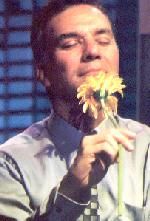SEARCH CurtainUp
REVIEWS
FEATURES
NEWS
Etcetera and
Short Term Listings
LISTINGS
Broadway
Off-Broadway
BOOKS and CDs
OTHER PLACES
Berkshires
London
LA/San Diego
Philadelphia
Elsewhere
QUOTES
On TKTS
LETTERS TO EDITOR
FILM
LINKS
MISCELANEOUS
Free Updates
Masthead
NYC Weather
Men From The Boys
By Laura Hitchcock

Alan Safier
(Photo:Ed Kirieger )
|
The play takes place in Michael's apartment during a wake for the charismatic and beloved Larry. The surviving original characters from The Boys in the Band" are there, as well as some iconic members of the younger generation.
Michael, the host and central character, is in love with Scott, a beautiful damaged boy. Despite Scott's obvious aversion to being touched, Michael tries to force himself on Scott. He also erupts in fury out of all proportion to Jason, a young activist. Michael seems to feel unappreciated but to have no understanding of the feelings of these young men. Michael is also a recovering alcoholic, gently teased by Donald, an alcoholically smashed middle-aged man, who makes the toast he drinks expand into the Dinoysian revels he has always enjoyed. Bernard, the sole African-American gay man and also in AA, discusses his marriage to a woman he met there ""because she's the only one I can trust."
Rick, a young nurse's aid at the hospital where Larry died, is also a musician and a man who reveals his own lies about his racial heritage. Emory is a one-dimensional flamboyant drag queen who is used as comic relief. Hank, Larry's lifetime companion and also a family man, is devastated by his loss. He is a centered powerful presence, a zero on the "swish odometer" as a transsexual author just described it on "Oprah!", and is the only one not ashamed to sob. Harold, a Vampire-esque apparition, returns at the end of the play to tell Michael he has AIDS. The two fight viciously over their lives, past and present, until Harold storms out screaming, "I'll call you tomorrow"" a line which some say is the essence of the play.
Crowley has written some terrific stuff. The play is crammed full of welcome and wonderful one-line witticisms and vignettes of the conflicts inherent in the gay life. He sniffs at some cliches like "Politically correct" and "celebration of life." He has one character snap "Your mind is like a bad neighborhood, I wouldn't go there alone", and Emory screaing "We were funny!" to Jason, speaking of his perception of the generation gap.
The debate between the gay men of today and the boys of 40 years ago who made their lives possible is one of the core elements of the play that could profitably be developed further. Michael's hostilities to younger men are another mystery. "I don't want anyone I could get", he declares. Scott, a drug addict, abused and emotionally crippled, is a tantalizing example of Michael's old tapes. Jason is another undeveloped character, serving mainly as a mouthpiece for the younger generation's political views.
Stephen Sachs' direction catches the beats of this well-constructed, if crowded play. He doesn't let the one-liners run away with it and sees to it that the excellent cast give full measure to their issues.
Robert Pine as Hank and Steve Doss as Rick stand out perhaps because of the honesty and seriousness of the characters they depict so well. Brian Carpenter, who has nothing to work with as Donald, conveys his bemused alcoholism wonderfully, demonstrating what a perfectly conceived facial expression can do. Georg Stanford Brown gives Bernard. a mellow edge. Seamus Dever is riveting as the tortured Scott but we miss the manipulativeness. Loren Freeman is everything a queen should be. Adam Huss's Jason is one of those characters we'd like to know more about; fortunately, Huss is dynamic. John Durbin's Harold is also a man of mystery but, in his case, one suspects it is deliberate and he loves it.
Last but far from least, Alan Safier's Michael, straight man only in the sense that he has to respond to the witticisms of the other characters, bully, recovering alcoholic tottering on the edge. Safier's strength is that he manages to play this fractured personality as everyman. He is left alone sniffing a flower when the curtain falls which may mean a trequel is in the offing. Maybe he does deserve a play all to himself.
Congratulations to Eric Sinkkonen's sophisticated set design that makes you want a Martini!
|
THE MEN FROM THE BOYS Playwright: Mart Crowley Director: Stephen Sachs Cast: Georg Stanford Brown (Bernard), Brian Carpenter (Donald), Seamus Dever (Scott), Steve Doss (Rick), John Durbin (Harold), Loren Freeman (Emory), Adam Huss (Jason), Robert Pine (Hank), Alan Safier (Michael) Set Design: Erik Sinkkonen Lighting Design: Kathi O'Donohue Costume Design: Shon Le Blanc Running Time: Two hours with one 10-minute intermission Running Dates: July 25-September 28, 2003 Where: The Fountain Theatre, 5060 Fountain Avenue, Los Angeles, phone: (323) 663-1525 Reviewed by Laura Hitchcock on August 3. |

At This Theater

Leonard Maltin's 2003 Movie and Video Guide

Ridiculous!The Theatrical Life & Times of Charles Ludlam

Somewhere For Me, a Biography of Richard Rodgers

The New York Times Book of Broadway: On the Aisle for the Unforgettable Plays of the Last Century

6, 500 Comparative Phrases including 800 Shakespearean Metaphors by CurtainUp's editor.
Click image to buy.
Go here for details and larger image.



